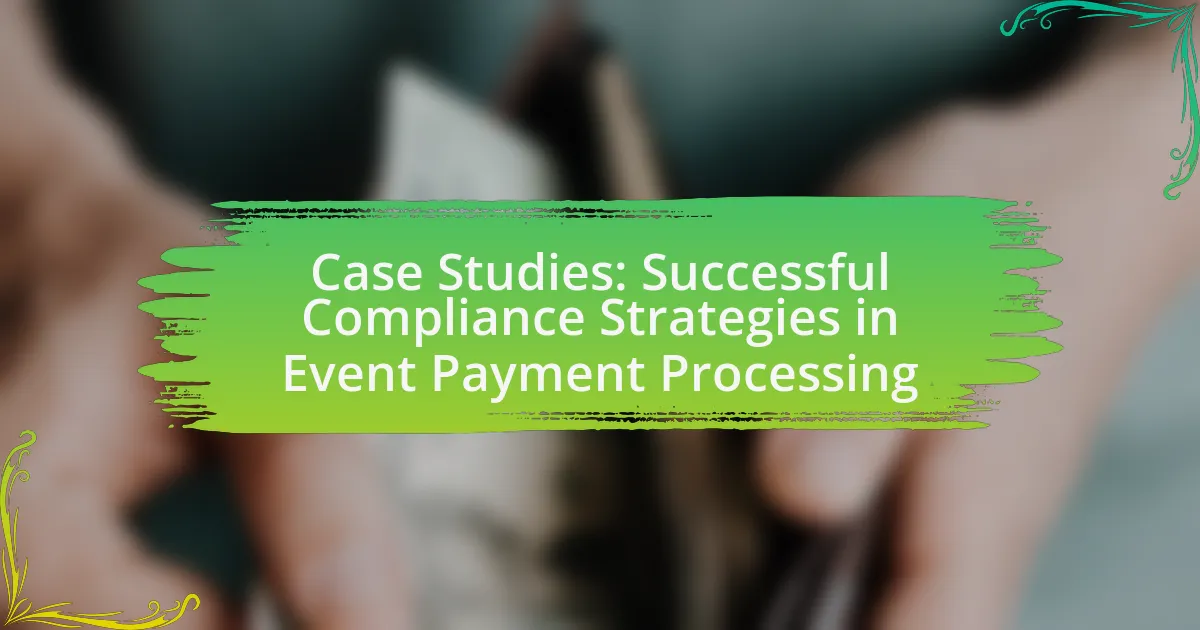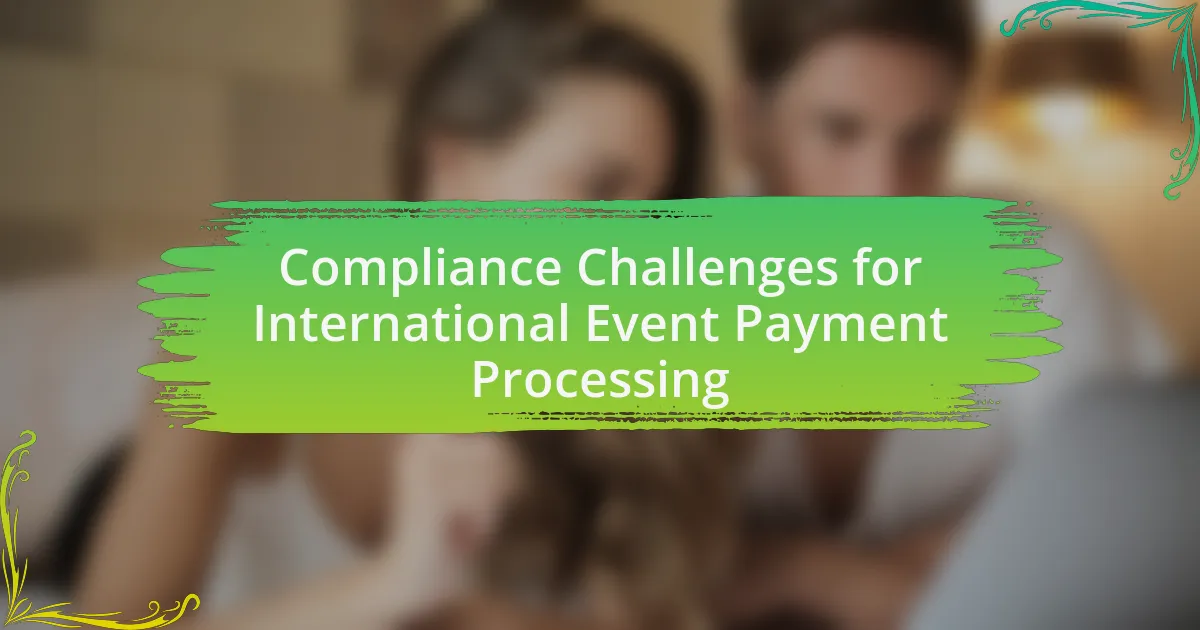Navigating PCI Compliance for Event Payment Processing is essential for event organizers to ensure the security of cardholder data during transactions. The article outlines the significance of adhering to the Payment Card Industry Data Security Standard (PCI DSS), detailing the potential risks of non-compliance, including financial penalties and data breaches. It discusses the key requirements for achieving compliance, the different levels of PCI Compliance based on transaction volume, and the necessary documentation to demonstrate adherence. Additionally, the article highlights best practices for maintaining compliance, the role of technology solutions, and the importance of staff training in overcoming compliance challenges.
What is PCI Compliance in the Context of Event Payment Processing?

PCI Compliance in the context of event payment processing refers to adherence to the Payment Card Industry Data Security Standard (PCI DSS), which establishes security measures for organizations that handle credit card transactions. This compliance is crucial for event organizers to protect sensitive cardholder data during ticket sales and other payment activities. Non-compliance can lead to data breaches, financial penalties, and loss of customer trust, emphasizing the importance of implementing robust security protocols as outlined in the PCI DSS, which includes requirements for secure network architecture, encryption, and regular security testing.
Why is PCI Compliance important for event organizers?
PCI Compliance is important for event organizers because it ensures the security of cardholder data during payment processing. By adhering to PCI standards, event organizers protect themselves from data breaches and fraud, which can lead to significant financial losses and reputational damage. In fact, organizations that experience a data breach can face costs averaging $3.86 million, according to the Ponemon Institute’s 2020 Cost of a Data Breach Report. Compliance also fosters customer trust, as attendees are more likely to engage with events that prioritize their financial security.
What are the potential risks of non-compliance?
The potential risks of non-compliance with PCI standards include financial penalties, data breaches, and reputational damage. Organizations that fail to comply may face fines from payment card networks, which can range from thousands to millions of dollars depending on the severity of the violation. Additionally, non-compliance increases the likelihood of a data breach, which can lead to the theft of sensitive customer information, resulting in costly remediation efforts and potential legal liabilities. Furthermore, reputational damage can occur as customers lose trust in an organization that does not prioritize their data security, leading to decreased sales and long-term business impacts.
How does PCI Compliance protect customer data?
PCI Compliance protects customer data by establishing a set of security standards designed to ensure that all companies that accept, process, store, or transmit credit card information maintain a secure environment. These standards include requirements for encryption, access control, and regular security testing, which collectively minimize the risk of data breaches and unauthorized access to sensitive information. For instance, according to the PCI Security Standards Council, organizations that comply with PCI standards significantly reduce their chances of experiencing a data breach, as compliance mandates regular security assessments and the implementation of robust security measures.
What are the key requirements of PCI Compliance?
The key requirements of PCI Compliance include maintaining a secure network, protecting cardholder data, implementing strong access control measures, regularly monitoring and testing networks, and maintaining an information security policy. Specifically, organizations must install and maintain a firewall to protect cardholder data, encrypt transmission of cardholder data across open and public networks, restrict access to cardholder data on a need-to-know basis, assign a unique ID to each person with computer access, and regularly test security systems and processes. These requirements are established by the Payment Card Industry Data Security Standard (PCI DSS), which outlines the necessary measures to protect sensitive payment information and reduce the risk of data breaches.
What are the different levels of PCI Compliance?
There are four levels of PCI Compliance, categorized based on the volume of credit card transactions processed annually. Level 1 applies to merchants processing over 6 million transactions per year and requires a full PCI DSS assessment by a Qualified Security Assessor. Level 2 is for merchants processing between 1 million and 6 million transactions annually, requiring a self-assessment questionnaire and vulnerability scans. Level 3 is designated for those processing 20,000 to 1 million e-commerce transactions per year, also requiring a self-assessment questionnaire. Finally, Level 4 is for merchants processing fewer than 20,000 e-commerce transactions or up to 1 million card transactions annually, which requires a self-assessment questionnaire but no formal assessment. These levels ensure that businesses implement appropriate security measures based on their transaction volume, thereby protecting cardholder data effectively.
What documentation is needed to demonstrate compliance?
To demonstrate compliance with PCI standards for event payment processing, organizations need to provide a Self-Assessment Questionnaire (SAQ), a Report on Compliance (ROC) if applicable, and evidence of security measures such as network diagrams, policies, and procedures. The SAQ is a key document that outlines the security requirements applicable to the organization’s payment processing environment. The ROC is required for Level 1 merchants and includes a detailed assessment by a Qualified Security Assessor (QSA). Additionally, documentation of employee training, incident response plans, and vulnerability scan reports further substantiates compliance efforts. These documents collectively validate adherence to PCI DSS requirements, ensuring that sensitive payment information is adequately protected.
How can event organizers achieve PCI Compliance?
Event organizers can achieve PCI Compliance by implementing security measures that protect cardholder data during payment processing. This includes using secure payment gateways, encrypting sensitive information, and ensuring that all systems handling payment data are regularly updated and patched. Additionally, event organizers must conduct regular security assessments and maintain documentation of their compliance efforts. According to the PCI Security Standards Council, organizations must adhere to the 12 requirements outlined in the PCI DSS, which include maintaining a secure network, protecting cardholder data, and regularly monitoring and testing networks.
What steps should be taken to assess current compliance status?
To assess current compliance status, organizations should conduct a thorough review of their existing policies and procedures against the PCI DSS requirements. This involves identifying all systems that store, process, or transmit cardholder data and evaluating their security measures. Additionally, organizations should perform a gap analysis to pinpoint areas where compliance is lacking and implement corrective actions. Regular internal audits and vulnerability assessments should also be conducted to ensure ongoing adherence to compliance standards. These steps are essential as they help organizations maintain the integrity of cardholder data and avoid potential penalties associated with non-compliance.
How can technology solutions assist in achieving compliance?
Technology solutions assist in achieving compliance by automating processes, ensuring data security, and providing real-time monitoring. Automation reduces human error in compliance tasks, while advanced security measures, such as encryption and tokenization, protect sensitive payment information. Real-time monitoring tools enable organizations to quickly identify and address compliance gaps, thereby maintaining adherence to standards like PCI DSS. According to the PCI Security Standards Council, organizations that implement technology solutions for compliance can reduce the risk of data breaches by up to 80%.
What are the common challenges in navigating PCI Compliance for events?

Common challenges in navigating PCI Compliance for events include understanding the complex requirements, managing data security across multiple vendors, and ensuring staff training on compliance protocols. The complexity arises because PCI Compliance has specific technical and operational requirements that can be difficult to interpret and implement effectively. Additionally, events often involve various third-party vendors, such as payment processors and ticketing platforms, which complicates the management of sensitive payment data and increases the risk of non-compliance. Furthermore, ensuring that all staff members are adequately trained on PCI standards is crucial, as human error is a significant factor in data breaches. According to the PCI Security Standards Council, organizations that fail to maintain compliance face potential fines and increased liability in the event of a data breach, highlighting the importance of addressing these challenges.
What obstacles do event organizers face during the compliance process?
Event organizers face several obstacles during the compliance process, primarily related to understanding and implementing the Payment Card Industry Data Security Standard (PCI DSS). These challenges include the complexity of the compliance requirements, which can be overwhelming due to the technical language and extensive documentation involved. Additionally, event organizers often struggle with limited resources, such as insufficient staff or budget constraints, which hinder their ability to meet compliance standards effectively.
Moreover, the dynamic nature of events, including varying locations and temporary staff, complicates the consistent application of security measures required for compliance. A study by the PCI Security Standards Council highlights that many organizations lack adequate training on compliance protocols, leading to unintentional violations. These factors collectively create significant hurdles for event organizers in achieving and maintaining PCI compliance.
How can limited resources impact compliance efforts?
Limited resources can significantly hinder compliance efforts by restricting the ability to implement necessary security measures and training programs. Organizations with insufficient financial, human, or technological resources may struggle to meet the stringent requirements set by compliance frameworks, such as the Payment Card Industry Data Security Standard (PCI DSS). For instance, a study by the Ponemon Institute found that organizations with limited budgets often allocate less than 10% of their IT budgets to compliance, leading to gaps in security protocols and increased vulnerability to data breaches. This lack of investment can result in inadequate monitoring, insufficient staff training, and failure to conduct regular audits, ultimately jeopardizing compliance and increasing the risk of penalties.
What role does staff training play in overcoming compliance challenges?
Staff training plays a crucial role in overcoming compliance challenges by equipping employees with the necessary knowledge and skills to adhere to regulations. Effective training programs ensure that staff understand the specific requirements of PCI compliance, such as data protection and secure payment processing protocols. Research indicates that organizations with comprehensive training initiatives experience a 50% reduction in compliance violations, highlighting the direct impact of informed personnel on maintaining compliance standards.
How can event organizers stay updated on PCI Compliance changes?
Event organizers can stay updated on PCI Compliance changes by subscribing to official PCI Security Standards Council communications and regularly reviewing their website for updates. The PCI Security Standards Council publishes guidelines, updates, and best practices that are essential for compliance. Additionally, attending industry conferences and webinars focused on payment security can provide insights into the latest compliance requirements and trends. Engaging with professional networks and forums dedicated to payment processing also helps organizers share knowledge and stay informed about changes in PCI standards.
What resources are available for ongoing education about PCI Compliance?
Resources available for ongoing education about PCI Compliance include the PCI Security Standards Council’s official website, which offers comprehensive guidelines, training materials, and webinars. Additionally, organizations can access online courses from accredited providers such as the SANS Institute and the International Association for Privacy Professionals (IAPP), which cover various aspects of PCI Compliance. Industry conferences and workshops, such as the PCI SSC Community Meetings, also provide valuable insights and networking opportunities for professionals seeking to enhance their knowledge in this area.
How can networking with industry peers help in compliance efforts?
Networking with industry peers can significantly enhance compliance efforts by facilitating the sharing of best practices and insights related to regulatory requirements. Engaging with others in the same field allows organizations to learn from each other’s experiences, identify common challenges, and develop effective strategies to address compliance issues. For instance, industry groups often provide resources, workshops, and forums that focus on the latest compliance standards, such as PCI DSS, which is crucial for event payment processing. This collaborative environment fosters a culture of accountability and continuous improvement, ultimately leading to more robust compliance frameworks.
What best practices should be followed for PCI Compliance in event payment processing?

To ensure PCI Compliance in event payment processing, organizations should implement strong access control measures. This includes restricting access to payment data to only those individuals who need it for their job functions, thereby minimizing the risk of unauthorized access. Additionally, organizations must regularly monitor and test networks to identify vulnerabilities, ensuring that any potential security gaps are addressed promptly.
Furthermore, encrypting cardholder data during transmission and storage is crucial, as it protects sensitive information from interception and unauthorized access. Maintaining a secure network infrastructure, including firewalls and anti-virus software, is also essential to safeguard against external threats.
Regular employee training on security awareness and PCI Compliance requirements helps to foster a culture of security within the organization. Finally, conducting annual PCI Compliance assessments and audits ensures that all practices remain up-to-date and effective in protecting payment information.
How can event organizers implement effective data security measures?
Event organizers can implement effective data security measures by adopting robust encryption protocols for sensitive data and ensuring compliance with PCI DSS standards. Encryption protects payment information during transmission and storage, making it unreadable to unauthorized users. Compliance with PCI DSS, which includes requirements for secure networks, access control, and regular monitoring, helps safeguard cardholder data and reduces the risk of data breaches. According to the PCI Security Standards Council, organizations that adhere to these standards significantly lower their chances of experiencing a data compromise.
What are the best practices for handling payment information securely?
The best practices for handling payment information securely include implementing encryption, using secure payment gateways, and adhering to PCI DSS standards. Encryption protects sensitive data during transmission, making it unreadable to unauthorized parties. Secure payment gateways ensure that transactions are processed in a safe environment, reducing the risk of data breaches. Compliance with PCI DSS standards, which include requirements for security management, policies, procedures, network architecture, and software design, further safeguards payment information. According to the PCI Security Standards Council, organizations that comply with these standards significantly lower their risk of data breaches and fraud.
How can regular audits enhance compliance efforts?
Regular audits enhance compliance efforts by systematically identifying gaps and weaknesses in adherence to regulations. These audits provide a structured approach to evaluate processes, ensuring that organizations meet the standards set by frameworks such as PCI DSS. For instance, a study by the Ponemon Institute found that organizations conducting regular audits experienced a 30% reduction in compliance-related incidents. This demonstrates that consistent auditing not only reinforces compliance but also mitigates risks associated with non-compliance.
What are the practical steps for maintaining PCI Compliance post-event?
To maintain PCI Compliance post-event, organizations should implement a series of structured steps. First, conduct a thorough post-event assessment to identify any security vulnerabilities that may have arisen during the event. This assessment should include reviewing access logs, transaction records, and any incidents that occurred. Next, ensure that all sensitive payment data is securely deleted or encrypted, as retaining unnecessary data can increase risk.
Additionally, organizations should update their security policies and procedures based on the findings from the assessment, ensuring that all staff are trained on these updates. Regularly scheduled security audits and vulnerability scans should be conducted to proactively identify and address potential compliance issues. Finally, maintain documentation of all compliance efforts and updates, as this is crucial for demonstrating adherence to PCI standards during future assessments. These steps collectively reinforce the organization’s commitment to PCI Compliance and help mitigate risks associated with payment processing.
How can event organizers ensure ongoing compliance after the event?
Event organizers can ensure ongoing compliance after the event by implementing a robust post-event compliance monitoring system. This system should include regular audits of payment processing systems to verify adherence to PCI DSS standards, which require organizations to maintain secure systems and processes for handling cardholder data. Additionally, organizers should provide ongoing training for staff on compliance requirements and update security protocols as necessary to address emerging threats. Regularly reviewing and updating policies in line with PCI DSS guidelines will further reinforce compliance efforts.
What should be included in a post-event compliance review?
A post-event compliance review should include an assessment of adherence to PCI DSS requirements, documentation of payment processing procedures, and an evaluation of security measures implemented during the event. This review must analyze transaction logs for anomalies, verify that all sensitive data was handled according to compliance standards, and ensure that staff training on compliance protocols was effective. Additionally, it should include a summary of any incidents or breaches that occurred, along with corrective actions taken. This structured approach ensures that all aspects of compliance are thoroughly evaluated, reinforcing the integrity of payment processing in line with PCI standards.






